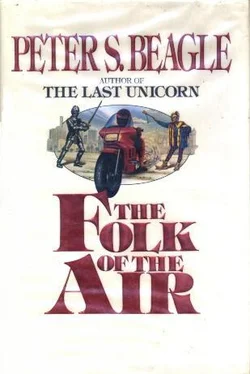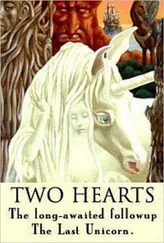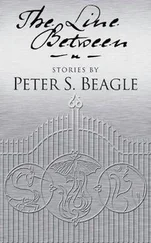He was clowning for her to some degree, and she did smile then, with genuine pleasure, but also with too much understanding. She said, “Look at you. Can’t ever get you talking about what’s really going on in there, and then, when you do start, it’s like a flash flood. A little dangerous.” Farrell was not sure what she meant; but when she bowed her head for a moment and knuckled wearily at a place at the top of her spine, his own backbone shivered and sparked in greedy tenderness, and he took a step toward her. Julie said, “Point D.”
“Point D,” Farrell said after a silence. “Ben. She was starting to tell me something, I think, right before the trick-or-treaters showed up.” He closed his eyes, trying to hear Sia’s rough, sudden voice asking him, “ What do you know about possession ?” Slowly, laying the words out as precisely as Julie had set down the bamboo pen, he said, “I read one time, whenever Mozart feels another flute concerto coming on, he takes over this housewife in Strasbourg, dictates it through her. Chopin, Mahler, Brahms, apparently they all take turns using the some poor woman. She says it’s a great honor, but very tiring.”
“And you think that’s what’s happening to Ben? Some ninth-century Viking just borrows him every now and then to run around in Barton Park?” The words were mocking, but the way she sat watching him was not.
Farrell shook his head. “I did at first, I guess because that’s the only kind of possession you ever hear about. Now I don’t know.” He hesitated, remembering the words that had been all but lost in Briseis’ terrible crying, and added, “It’s not what Sia thinks.”
Julie drew breath to speak and then didn’t. Her thumbnails were scraping at each other again. “Well, you’ll have to bring me over there for dinner sometime,” she said at last. “Sounds like quite a crowd.”
Farrell looked at his watch. “Dinner. Point E. High-level conference to be continued over sashimi and sake at the Half-Moon House. Say amen, and let’s boogie.”
But she was already turning her chair around again, rotating the drawing to sketch the retina from another angle. “Joe, I can’t go anywhere, I’m going to be up all night with this stuff. Call me tomorrow.”
“I’ll cook,” Farrell said. He found himself childishly reluctant to leave her in the quiet, warm clutter of her workroom and walk out into aimless twilight with his mind still bustling with shadows. “You’ve got that fish in the refrigerator, I’ll make lemon fillets. Just work, don’t worry about it. Lemon fillets, nice orange and onion salad, I fix. You got any real garlic?”
Julie stood up and came to him, putting her hands in his hair. “Baby, go home,” she said gently. “This is what I do. I’m not hungry and I like working at night and I really have trouble working with anyone in the house. It’s getting to be a problem with men.”
“Never used to be a problem.” The sound of his own complaining voice fed his strange fretfulness back on itself. “The first time I ever saw you, you were painting a still life in the middle of a party. In the kitchen, by God—people rampaging in and out, necking, fixing drinks, something going on the stove, smelling like a home urinalysis, and you eating an apple, painting away, not paying no mind to nothing. You remember that? I think I was looking for the paper towels. A whole bunch of paper towels.”
“I was eighteen years old, what did I know?” Julie said. “Go home, Joe. This is what I do now. The drawings have to be ready tomorrow morning, because somebody needs them. The Lady Murasaki, that scared, show-offy girl you want back, she’s for weekends, special occasions, whenever I need her.” She kissed him then, biting his lower lip and shaking her head slightly. “I still do,” she said, “once in a while. Maybe it’s the same way with Ben.”
Farrell asked, “What about Ben? I have to talk to him, I have to do something about Ben. What the hell do you think I should do?” For a moment Julie’s hands tightened on the back of his neck, cool as new leaves, but holding him hard enough that he could feel the smooth callouses on the sides of her drawing fingers. But she only said, “Call me at work,” and kissed him again, and—as neatly as Sia ever hemmed his memory or Nicholas Bonner made time clear its throat—they were smiling through her screen door; but he turned away first, never knowing how long she leaned against the door afterward, and a pair of early stars were pricking into view above the Waverly as he sat in Madame Schumann-Heink, wishing he were just arriving at Julie’s house and wondering what to say to Ben. I can’t go back there until I think of something .
Eventually he drove away from the university streets, down below Gould, past the freeway, almost as far as the Bay, to eat ribs and sausages hot enough to cause double vision and cauterize polyps, in a diner slightly bigger than a camper truck. The decor was the same as in his student days—framed railroad timetables and signed photographs of almost-familiar singing groups—and the sour-tempered daughters of the sour-tempered black couple he remembered were still yelling at each other in the kitchen. Farrell found this immensely comforting and overate out of several kinds of hunger.
Standing outside the door, breathing carefully to test his charred sinuses, he heard a rough, friendly voice, sounding almost at his ear: “Hey there, old Knight of Ghosts and Shadows.” Farrell turned and saw the man he knew as the Saracen Hamid ibn Shanfara crossing the street toward him, in company with Lovita Bird and two of the musicians from the King’s Birthday Revels. One was tall, with long, thinning brown hair and the bovinely enduring expression of a Flemish St. Anthony; the other looked like a happy satyr, redbearded and bowlegged. They bowed formally to Farrell, there in the tarnished light of the rib joint, as Hamid made introductions. “This is Messer Matteo dei Servi, and this here now mauvais sujet and generally worthless type is Brother Felix Arabia.” Farrell bowed back and asked them whither they were bound.
“Armed combat class,” Hamid answered cheerfully. “Come on along with us. Nothing on public TV tonight except cooking and dog-walking, anyway.”
“Armed combat,” Farrell said. “As in clash of broadsword on buckler. Shivering of lances. Yield thee, caitiff.”
The satyr Felix Arabia grinned at him. “Thursday nights, seven-thirty. Best show in town, for the money.” He cocked his rowdy head at the saint. “He’s serious about it, he’s teacher’s pet, just about. Hamid and Lovita and me, we’re not really in the class, we’re just his occasional cheerleaders. Groupies.” He made a baton-twirling gesture, which somehow contained the hard twinkle of an invisible sword.
Farrell found that he was walking with them, Lovita Bird’s arm through his and Matteo dei Servi saying shyly, “Actually, I’m not that good, not enough time to practice. I think of it like a discipline, like a philosophy. It’s great for my concentration.” The long, cumbersome bundle that he and Felix took turns carrying kept nudging Farrell’s side coldly, like an inquisitive shark.
Farrell asked, “Who teaches this stuff? Where on earth do you find people who know about medieval fighting techniques?” Felix Arabia looked mildly surprised. “Man, everybody in Avicenna is insanely knowledgeable about something. Especially fighting. Any kind of combat master you want—armed, unarmed—they’re all over the place these days. Like wandering samurai in Kurosawa movies.”
“Lute players, now,” Matteo dei Servi said. “Lute players are tricky to find. Good lute players.”
Felix Arabia said, “Speaking of which,” and for the rest of the way they took turns urgently coaxing Farrell to join their consort Basilisk. When he pointed out that he could only play one instrument well, while the rest of the group—except for the Lady Criseyde, their percussionist—were clearly at home with half a dozen, he was reassured by Felix, “Listen, we don’t need any more damn sackbuts and serpentines, but we have got to have a lute.”
Читать дальше












